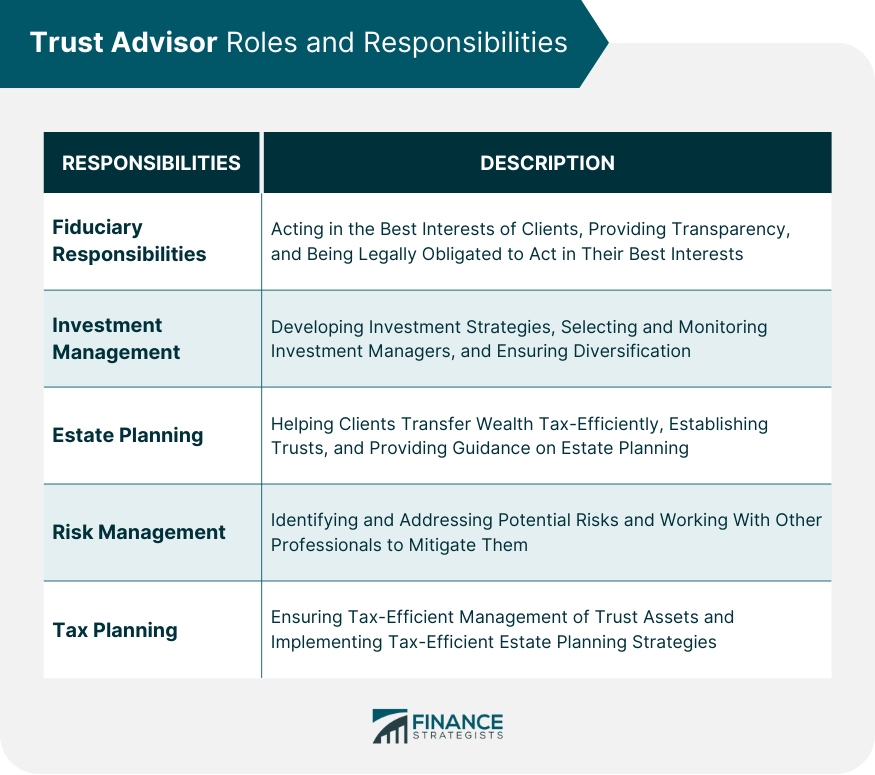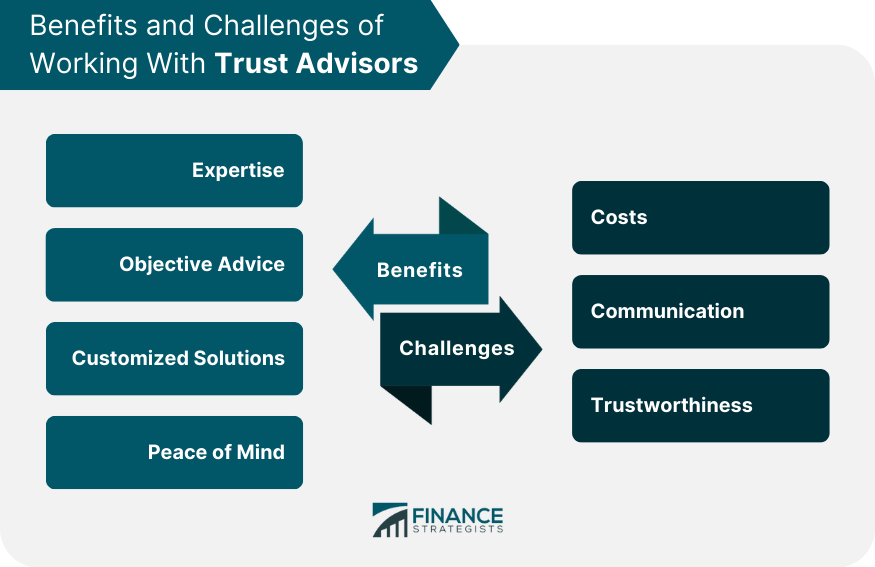Trust advisors are financial professionals who specialize in managing trusts, a legal arrangement that allows a third party, or trustee, to hold and manage assets on behalf of one or more beneficiaries. They provide guidance and expertise in trust administration, investment management, tax planning, and estate planning, helping clients protect their assets, minimize taxes, and ensure their wishes are carried out as intended. They may work with individuals, families, businesses, or non-profit organizations, depending on the type of trust and the specific needs of the client. Trust advisors also act as fiduciaries, placing the best interests of their clients above their own, ensuring that the trust is managed in a way that aligns with the client's goals and objectives. One of the primary responsibilities of trust advisors is to act as a fiduciary, which means they must put the best interests of their clients and beneficiaries above their own. This includes making decisions that are in line with the client's objectives, ensuring the trust is administered according to the terms of the trust agreement, and providing full transparency in all aspects of trust management. As fiduciaries, trust advisors are legally obligated to act in the best interests of their clients and can be held liable for any breach of this duty. This high level of responsibility underscores the importance of working with a qualified and experienced trust advisor. Trust advisors are responsible for managing the investment assets within the trust, with the goal of preserving and growing the trust's principal while generating income for the beneficiaries. This involves developing an investment strategy that aligns with the client's objectives, risk tolerance, and the specific requirements of the trust. Trust advisors may also be responsible for selecting and monitoring investment managers, conducting due diligence on investment opportunities, and ensuring that the trust's investment portfolio remains diversified and in line with the client's objectives. Trust advisors play a key role in the estate planning process, helping clients develop a comprehensive plan to transfer their wealth to beneficiaries in a tax-efficient and orderly manner. This may involve establishing various types of trusts, such as revocable living trusts, irrevocable trusts, or charitable trusts, depending on the client's goals and objectives. In addition to creating trusts, trust advisors may also provide guidance on other estate planning strategies, such as wills, powers of attorney, and advance healthcare directives, to ensure that the client's wishes are carried out as intended. One of the responsibilities of trust advisors is to manage and mitigate risks associated with the trust's assets and investment portfolio. This involves identifying potential risks, such as market volatility, interest rate fluctuations, or changes in tax laws, and developing strategies to address these risks. Risk management may also involve working with other professionals, such as insurance agents or attorneys, to implement risk mitigation strategies, such as purchasing life insurance policies or creating legal structures to protect the trust's assets. Trust advisors are responsible for ensuring that the trust's assets are managed in a tax-efficient manner. This involves understanding the complex tax laws and regulations governing trusts, as well as staying up-to-date on any changes to these laws. Tax planning strategies may include optimizing the trust's investment portfolio to minimize capital gains taxes, structuring trust distributions to minimize income taxes for beneficiaries, and implementing tax-efficient estate planning strategies. By working closely with clients and their tax services professionals, trust advisors can help minimize the tax burden associated with trust management and ensure that the trust's assets are preserved for the benefit of the beneficiaries. TITLE: Trust Advisor Roles and Responsibilities Personal trust advisors work with individuals and families to manage their trusts and help them achieve their financial and estate planning goals. These advisors may assist clients in establishing and managing various types of trusts, including living trusts, testamentary trusts, and special needs trusts, depending on the specific needs and objectives of the client. Corporate trust advisors work with businesses and organizations to establish and manage trusts for various purposes, such as employee benefit plans, pension plans, or charitable giving programs. These advisors have specialized knowledge of the complex tax, legal, and regulatory issues that impact corporate trusts and can help clients navigate these challenges to achieve their objectives. Public trust advisors work with government entities, non-profit organizations, and other public entities to establish and manage trusts for the benefit of the public. These advisors may be involved in managing endowments, pension funds, or other public trust assets and have specialized knowledge of the unique legal and regulatory requirements that apply to public trusts. Trust advisors typically have a strong educational background in finance, accounting, or a related field. Many hold undergraduate or graduate degrees in finance, accounting, business administration, or economics. In addition to formal education, trust advisors may also receive specialized training in trust management, estate planning, and tax law through professional development courses or industry conferences. To demonstrate their expertise in trust management, many trust advisors hold professional licenses or certifications. Some of the most common designations for trust advisors include the Certified Trust and Financial Advisor (CTFA), Certified Financial Planner (CFP), and Certified Public Accountant (CPA) credentials. These certifications typically require trust advisors to complete a rigorous course of study, pass a comprehensive examination, and meet ongoing continuing education requirements. By obtaining these designations, trust advisors demonstrate their commitment to professionalism and expertise in their field. Experience is a crucial factor in the qualifications of a trust advisor. Trust advisors should have a strong track record of success in managing trusts, navigating complex financial and tax issues, and working with clients to achieve their goals. This experience may be gained through working with a variety of clients, including individuals, families, businesses, and non-profit organizations. In addition to their work with clients, trust advisors may also gain industry experience by working closely with other financial professionals, such as investment managers, attorneys, and tax advisors, as well as participating in professional organizations and industry conferences. Trust advisors are held to high ethical standards, as they are responsible for managing the financial affairs of their clients and acting in their best interests. To maintain their professional licenses and certifications, trust advisors must adhere to strict codes of professional conduct and ethical guidelines. These ethical standards include maintaining client confidentiality, disclosing potential conflicts of interest, and acting in a manner that promotes the best interests of the client and the trust beneficiaries. Trust advisors bring a wealth of expertise in trust management, investment strategies, tax planning, and estate planning to their clients. By working with a trust advisor, clients can benefit from this expertise and ensure that their trust is structured and managed in the most effective and tax-efficient manner possible. As fiduciaries, trust advisors are required to provide objective advice that is in the best interests of their clients and the trust beneficiaries. This means that trust advisors are focused on helping clients achieve their goals and objectives, rather than promoting specific products or services that may not be in the client's best interest. Trust advisors work closely with clients to develop customized trust management strategies that are tailored to the specific needs and objectives of the client. This may include creating unique investment strategies, implementing tax-efficient estate planning techniques, or addressing the specific needs of beneficiaries, such as special needs trusts or education trusts. Working with a trust advisor can provide clients with peace of mind, knowing that their trust is being managed by a professional with the expertise and experience needed to protect and grow their assets. Trust advisors can help clients navigate the complex world of trust management and ensure that their wishes are carried out as intended. One of the challenges of working with a trust advisor is the cost of their services. Trust advisors typically charge fees based on the value of the assets they manage, which can be a significant expense for clients. However, it is essential to weigh the cost of the trust advisor's services against the value of the expertise and guidance they provide in managing the trust and preserving the client's assets. Effective communication is critical when working with a trust advisor. Clients need to ensure that they are regularly informed about the status of their trust, the performance of the investments, and any changes to the trust's management or strategy. Trust advisors must be proactive in keeping clients informed and addressing any concerns or questions that may arise. Establishing trust is an essential aspect of working with a trust advisor. Clients need to feel confident that their advisor is acting in their best interests and is committed to helping them achieve their goals. It is crucial to carefully research and select a trust advisor with a strong track record of success, ethical conduct, and client satisfaction. Trust advisors are financial professionals who specialize in managing trusts and providing guidance on investment management, tax planning, and estate planning. They play a vital role in helping clients protect their assets, minimize taxes, and ensure that their wishes are carried out as intended. There are various types of trust advisors, including personal trust advisors, corporate trust advisors, and public trust advisors, each catering to different types of clients and their unique needs. The benefits of working with a trust advisor include their expertise, objective advice, customized solutions, and the peace of mind they provide. However, there are challenges to working with trust advisors, such as the costs associated with their services, the need for effective communication, and establishing trustworthiness. By carefully selecting a trust advisor with the appropriate qualifications, experience, and ethical standards, clients can overcome these challenges and ensure that their trust is managed effectively and in line with their goals and objectives.What Are Trust Advisors?
Roles and Responsibilities of Trust Advisors
Fiduciary Responsibilities
Investment Management
Estate Planning
Risk Management
Tax Planning

Types of Trust Advisors
Personal Trust Advisors
Corporate Trust Advisors
Public Trust Advisors
Qualifications of Trust Advisors
Education and Training
Professional Licenses and Certifications
Industry Experience
Ethical Standards
Benefits of Working With Trust Advisors
Expertise
Objective Advice
Customized Solutions
Peace of Mind
Challenges of Working With Trust Advisors
Costs
Communication
Trustworthiness

Final Thoughts
Trust Advisors FAQs
Trust Advisors are professionals who specialize in managing and advising clients on matters related to trusts, estates, and other fiduciary arrangements.
Trust Advisors have various responsibilities such as investment management, estate planning, risk management, tax planning, and ensuring that the assets of the trust are managed in accordance with the client's wishes.
Trust Advisors typically have a combination of education, training, industry experience, and professional licenses and certifications. They are also required to adhere to high ethical standards.
Working with Trust Advisors provides clients with expertise, objective advice, customized solutions, and peace of mind. Trust Advisors can help clients achieve their financial goals and protect their assets.
The challenges of working with Trust Advisors include the costs of their services, communication issues, and concerns about their trustworthiness. Clients should carefully research and select a Trust Advisor they feel comfortable working with.
True Tamplin is a published author, public speaker, CEO of UpDigital, and founder of Finance Strategists.
True is a Certified Educator in Personal Finance (CEPF®), author of The Handy Financial Ratios Guide, a member of the Society for Advancing Business Editing and Writing, contributes to his financial education site, Finance Strategists, and has spoken to various financial communities such as the CFA Institute, as well as university students like his Alma mater, Biola University, where he received a bachelor of science in business and data analytics.
To learn more about True, visit his personal website or view his author profiles on Amazon, Nasdaq and Forbes.















